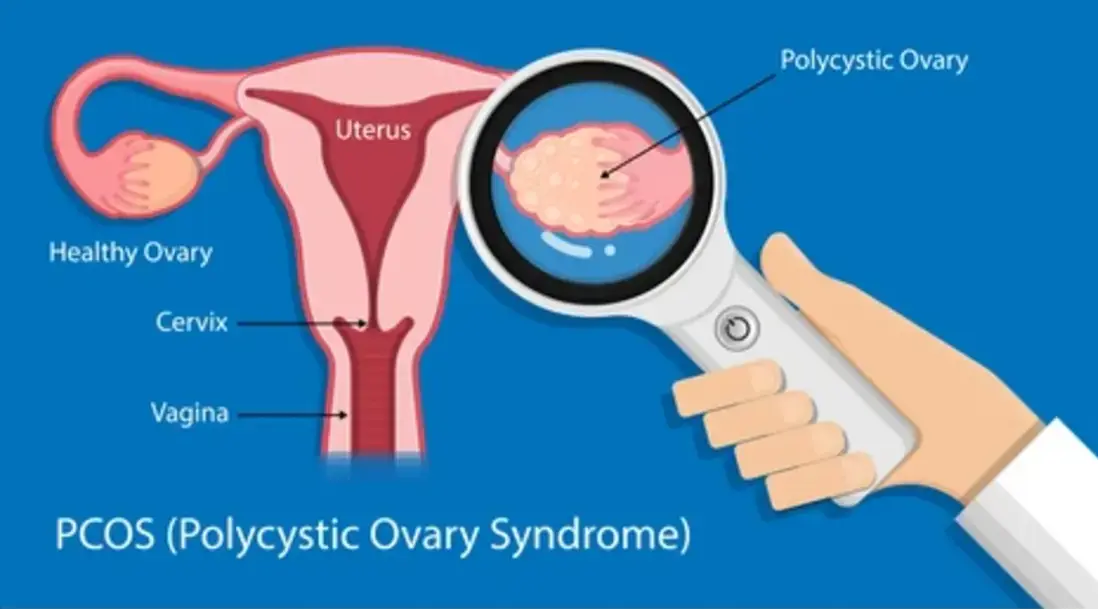Nearly all women, about 10%, may be encountered with a frequently occurring medical problem called Polycystic Ovarian Syndrome during their reproductive age.
PCOS manifestations can be unique from one person to the next and some ladies could also be totally not showing any signs. Often people notice the symptoms to be linked with the increase in male hormones (androgens) or as the body’s inability to respond well to insulin (insulin resistance).
Sometimes such symptoms might be the same as others’ signs and symptoms of other diseases, for this reason it is difficult to come up with exact diagnosis. This very thing can be the point that makes the diagnosis be postponed.
Symptoms
What are the first signs of PCOS?
Polycystic Ovary Syndrome isn’t a sickness, but a group of signs that can be different for each person. The most common signs of PCOS include having periods that are missed, irregular, infrequent, or too long.
Other signs :
Missed, irregular, infrequent, or prolonged periods: Common and noticeable changes in menstrual cycles.
Excess body hair (hirsutism): Unwanted hair growth on face, chest, belly, arms, fingers, and toes.
Oily skin: Increased skin oiliness due to higher androgen levels.
Acne: Breakouts on the face, chest, and/or back.
Darkened skin: Patches of skin that appear darker under the breasts, arms, or on the neck.
Skin tags: Small flaps of excess skin, often found on the neck or armpits.
Pain in the lower-belly (pelvic) area: Occurs during periods and occasionally at other times.
Weight gain : Approximately 50% of individuals with PCOS experience weight gain, especially in the abdominal area.
Ovarian cysts: Enlarged ovaries or the presence of numerous egg sac cysts (follicles) visible on ultrasound.
Mood changes: Increased risk of mood swings, depression, or anxiety, possibly linked to hormonal changes and the stress of dealing with PCOS symptoms.
Infertility IQ: trouble conceiving without medical help
It happens sometimes that PCOS doesn’t show you any signs to let you know anything or the symptoms are so small that look like nothing to you. As there are other factors that can also make periods irregular, it is possible that you may take some time to resume if that is the case.

Causes
- High Androgen Levels: Many women with PCOS experience high levels of male hormones, known as androgens. This condition, called hyperandrogenism, is a common symptom .
- Insulin Resistance: Having more insulin than needed can affect how your ovaries function and release eggs (ovulate). It can also make it easier to gain weight but harder to lose it.
- Long-term Inflammation: Prolonged, mild inflammation in the body may lead to an excess production of androgens.
- Excess Weight: The relationship between weight and PCOS is complex. Obesity is a main factor that can lead to PCOS, but having PCOS can also make it more likely for a woman to gain weight.
Is PCOS Genetic?
It’s not clear if PCOS is inherited, but your chances of having it increase if your close family members also have the condition. Approximately 20%-40% of individuals with PCOS have a mother or sister diagnosed with the condition, possibly due to shared lifestyle factors or genetics.
Factors that might increase your chances of experiencing certain symptoms include:
- Family History: If your family has a history of period problems or disorders, including PCOS, it could increase your risk.
- Type 2 Diabetes: Having type 2 diabetes raises the chances of getting PCOS.
- Weight Issues: Being overweight or obese makes it more likely for you to have PCOS.
- Fast Weight Gain: If you gain weight quickly, it can also be a risk factor for PCOS.
How do people find out if they have the condition or not?
- Medical History: The doctor will be interested in knowing more about your medical history, for instance, your periods; how frequent the periods appear (regular or too much or less), trouble in getting pregnant, any changes in your weight, and other things like some hair growth in unwanted places or mood swings. They could well inquire whether their mom or sister have PCOS as well.
- Physical Checkup: The doctor will undergo a complete checkup where signs of high production of these hormones or insulin will be looked for. They will use this tactic to find anything strange in the pelvic region or in such things as the lumps as well.
- Blood Tests: Some possible blood tests, or blood test combinations can aid in determining the diagnosis. They could exam the surplus of glucose, insulin, cholesterol, and androgens (vinyl) (replaced).
- Other Tests: The doctor might just suggest more tests like ultrasounds, sleep studies,or GTT to be sure of your pregnancy. For instance, if felt so they could send you a psychiatr its for any signs of depression or anxiety.
When does the condition start?
A category who undergo puberty and give birth can develop PCOS at any moment starting when they experience puberty. Many find themselves diagnosed during this age group and nothing is more common than being evaluated when conceiving a child. If you’re overweight or other members of your family had it, you have a higher risk of developing the syndrome too.
Can having the condition increase the chance of a miscarriage?
Occurrence of PCOS can predispose to the occurrence of certain problems in pregnancy that primarily aren’t any obstacles for having a healthy pregnancy because most women or people with female reproductive organs assigned at birth can usually do very well during pregnancy. Other problems related to PCOS and pregnancy include a higher risk of:Other problems related to PCOS and pregnancy include a higher risk of:
Among the gestational diabetes, preeclampsia and high blood pressure. For example, premature (less than 37 weeks) or undergoing C-section because of obesity, diabetes and other problems which make pregnant woman face risk of high blood pressure.

